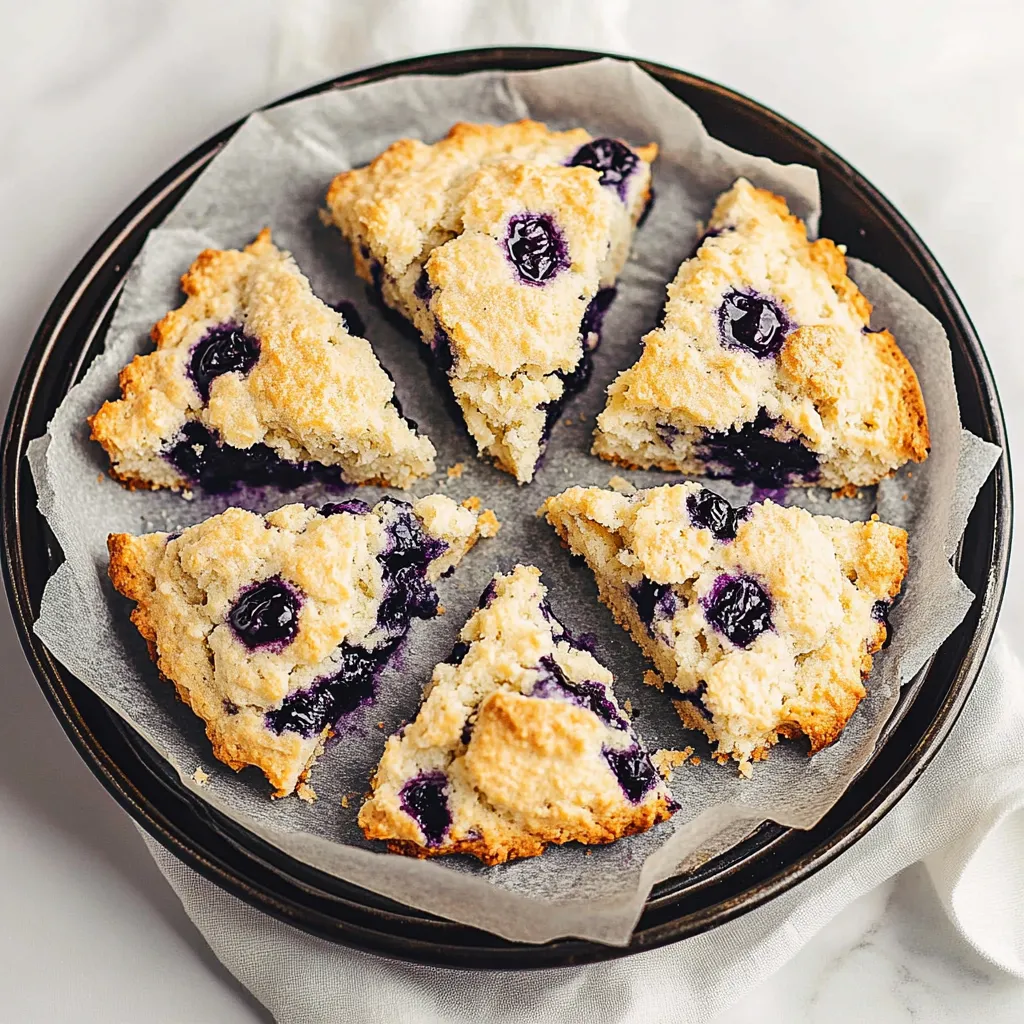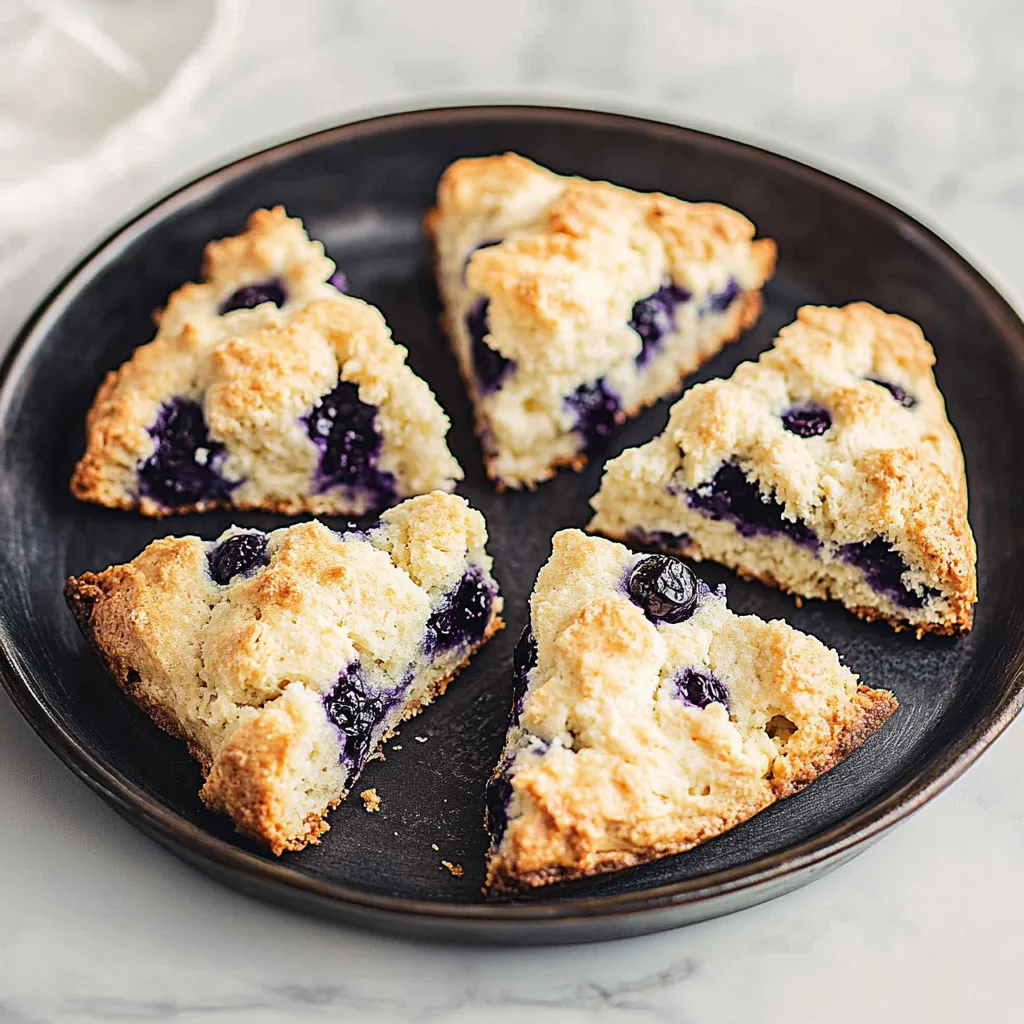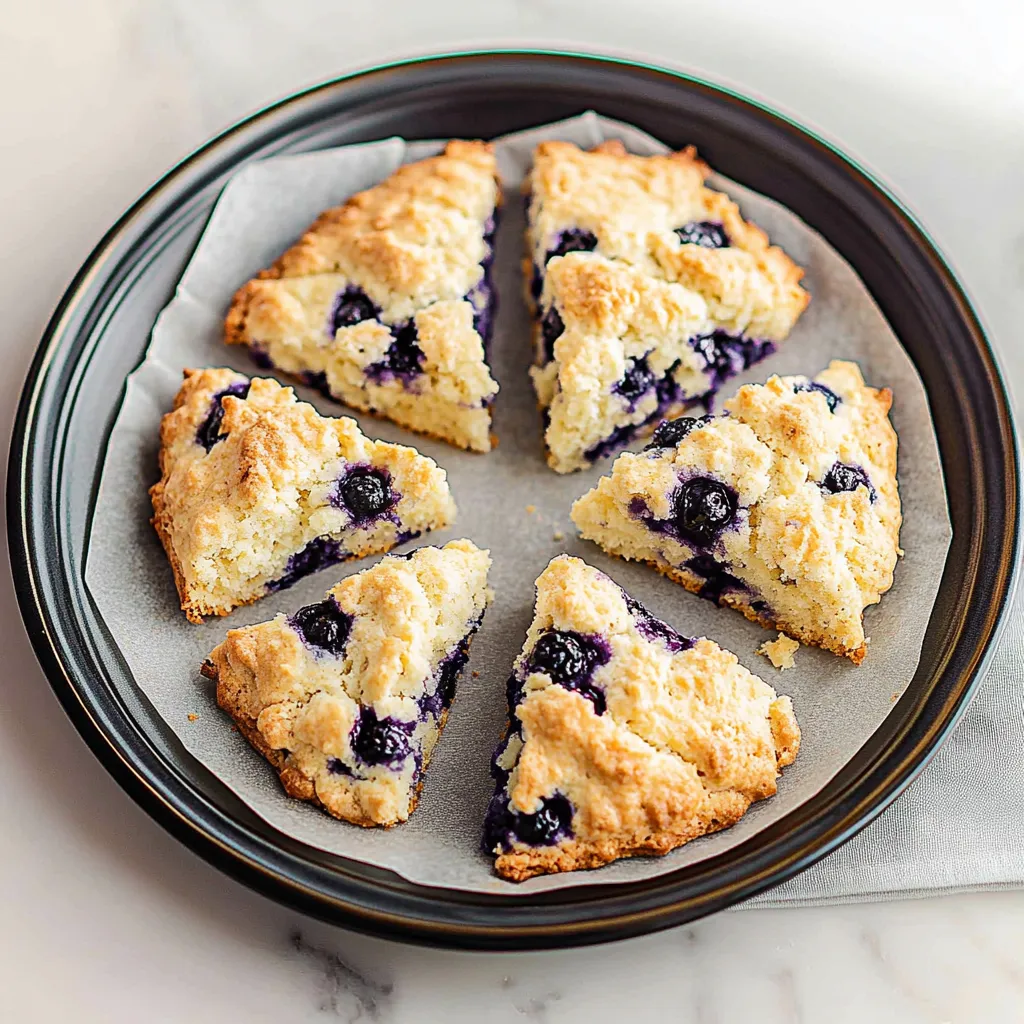 Pin it
Pin it
This buttery, tender scone recipe transforms simple pantry ingredients into bakery-quality treats in just 30 minutes. The perfect balance of crumbly exterior and moist interior, these blueberry-studded beauties have become my signature breakfast contribution for family gatherings.
I developed this recipe during a particularly rainy weekend at our family cabin. With limited ingredients and nowhere to go, these scones were born from necessity but have since become the most requested breakfast whenever my nieces and nephews visit.
Ingredients
- All purpose flour: Provides the perfect structure while keeping the scones tender
- Granulated sugar: Offers just enough sweetness without overwhelming the berries
- Baking powder and baking soda: Work together for the perfect rise and texture
- Salt: Enhances all flavors and balances the sweetness
- Cold unsalted butter: Creates those flaky, delicious layers
- Buttermilk: Brings tangy flavor and helps activate the leavening agents
- Vanilla extract: Adds warmth and depth to the flavor profile
- Fresh or frozen blueberries: Burst with natural sweetness, use wild blueberries for intense flavor
- Coarse sugar: Optional but creates a delightful sweet crunch on top
Step-by-Step Instructions
- Prepare Your Workspace:
- Preheat your oven to 400°F and line a baking sheet with parchment paper. Having everything ready before you start ensures the butter stays cold throughout the process, which is crucial for flaky scones.
- Mix Dry Ingredients:
- In a large bowl, thoroughly whisk together the flour, sugar, baking powder, baking soda, and salt until evenly distributed. This ensures your scones will rise evenly and have consistent flavor throughout.
- Incorporate the Butter:
- Cut the cold butter into the flour mixture using a pastry cutter, two knives, or your fingertips. Work quickly to maintain cold butter temperature. Stop when the mixture resembles coarse crumbs with some pea sized pieces of butter still visible. These butter pockets create the flaky texture that makes scones so delicious.
- Add Wet Ingredients:
- Combine buttermilk and vanilla in a separate bowl, then pour into the flour mixture. Stir gently with a fork or wooden spoon just until the dough starts to come together. The mixture should look shaggy and somewhat dry. Overmixing will develop gluten and result in tough scones.
- Fold in Blueberries:
- Add the blueberries to the dough and fold them in with just a few turns. If using frozen berries, keep them frozen until the last minute and handle minimally to prevent the dough from turning purple. Some streaking is natural and creates beautiful swirls in the finished scones.
- Shape the Dough:
- Turn the dough onto a lightly floured surface and gently press it into an 8 inch circle about 1 inch thick. Avoid kneading or overworking the dough. The less you handle it, the more tender your scones will be.
- Cut and Prepare for Baking:
- Use a sharp knife to cut the dough circle into 8 equal wedges. Transfer each wedge to your prepared baking sheet, leaving about an inch between each one to allow for expansion. Brush the tops generously with additional buttermilk and sprinkle with coarse sugar for a professional bakery finish.
- Bake to Golden Perfection:
- Bake in your preheated oven for 18 to 22 minutes. Look for golden brown edges and tops that spring back slightly when touched. The bottoms should be browned but not dark. Every oven is different, so start checking at the 15 minute mark.
 Pin it
Pin it
Buttermilk is the secret ingredient I will never compromise on in this recipe. My grandmother always kept a carton in her refrigerator specifically for baking, and she taught me that the slight tang and tenderizing properties it brings to baked goods simply cannot be replicated. Every time I make these scones, I think of her kitchen and how she would always set aside the smallest one just for me to enjoy while it was still warm.
Make Ahead Options
These scones freeze beautifully both before and after baking. To freeze unbaked scones, place the cut wedges on a baking sheet and freeze until solid, then transfer to a freezer bag. When ready to bake, no need to thaw just add a few minutes to the baking time. For baked scones, cool completely then wrap individually in plastic wrap and place in a freezer bag. Thaw at room temperature or warm slightly in the oven before serving.
Seasonal Variations
While blueberries create a classic scone, this versatile dough welcomes many substitutions. In summer, try fresh raspberries or blackberries. Fall calls for diced apples with cinnamon. Winter citrus zest brightens the flavor, and spring strawberries create a delightful treat. Whatever the season, maintain the same quantity of mix ins to preserve the perfect dough consistency. My family particularly loves them with mixed berries during our annual summer picnic.
Serving Suggestions
Serve these scones slightly warm for the ultimate experience. A light smear of salted butter creates a perfect salty sweet combination. For a more indulgent treat, offer them with clotted cream and berry jam. These scones pair beautifully with coffee, tea, or even a glass of cold milk. For brunch gatherings, I arrange them on a wooden board surrounded by small dishes of different toppings, allowing guests to customize their own.
 Pin it
Pin it
These scones are a simple yet impressive addition to any breakfast or brunch table. Try them today and discover your new favorite baking tradition!
Frequently Asked Questions
- → Can I use frozen blueberries instead of fresh?
Yes, you can absolutely use frozen blueberries. In fact, they're often preferred as they're less likely to burst during mixing. Keep them frozen until the last minute and fold them in gently to prevent the dough from turning purple.
- → Why is it important to use cold butter?
Cold butter is essential for creating flaky, tender scones. As the cold butter melts in the oven, it creates steam pockets that result in those desirable flaky layers. Room temperature butter would incorporate too thoroughly into the dough, resulting in a more cake-like texture.
- → What can I substitute for buttermilk?
If you don't have buttermilk, you can make a substitute by adding 1 tablespoon of lemon juice or white vinegar to regular milk and letting it sit for 5-10 minutes until slightly thickened. Yogurt thinned with a bit of milk also works well.
- → How do I know when the scones are done baking?
The scones are done when they're golden brown on top and a toothpick inserted into the center comes out clean. The bottoms should be browned as well. They should feel set when lightly pressed in the center, not soft or doughy.
- → How long do these scones stay fresh?
These scones are best enjoyed the day they're baked, particularly while still warm. However, they can be stored in an airtight container at room temperature for 1-2 days. For longer storage, freeze baked scones for up to 3 months and reheat in a 300°F oven for 10 minutes.
- → Can I prepare the dough ahead of time?
Yes! You can prepare the dough, shape it into scones, and freeze them unbaked on a baking sheet. Once frozen, transfer to a freezer bag. When ready to bake, place the frozen scones directly on a baking sheet and add 3-5 minutes to the baking time—no need to thaw.
